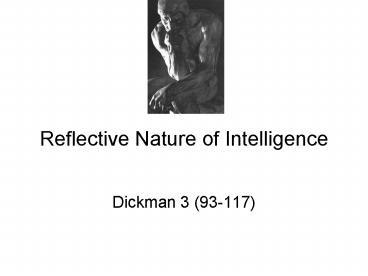Reflective Nature of Intelligence - PowerPoint PPT Presentation
1 / 10
Title:
Reflective Nature of Intelligence
Description:
These common disposition are a product of evolution over millions of years of natural selection ... Once the children begin to behave according to their ... – PowerPoint PPT presentation
Number of Views:170
Avg rating:3.0/5.0
Title: Reflective Nature of Intelligence
1
Reflective Nature of Intelligence
- Dickman 3 (93-117)
2
Reflect To throw or bend back from any
image of to think or consider seriously
- Your brain constructs the understanding of things
the way it thinks they are - They also can project the way they can be
- In order to do this the brain developed a true
brain typology as the cortex evolved - And in order to manage all the brain capacities,
the frontal lobe was developed - Area of the brain the resolve, create and project
- A true organ of civilization
- Reflection is the ultimate stringing together of
patterns of information through serious
consideration of constructed knowledge - Explore for further consideration
- And applications
3
- Calvin (1996)
- The neural mechanisms that enable the stringing
together meaningless phonemes to form meaningful
words are the same mechanisms than that string
together words into sentences, concepts and
narrative stories - It is this same process that is used for the
capacity to analyze, plan, and predict - Capacity for conscious reflection is the
distinguishing dimension for human intelligence - Damasio (1999)
- This is how we know ourselves in the past, future
and present - Prior knowledge must be present for the brain to
manipulate and transform this knowledge
4
- Reflective intelligence enhancing the
perception potential of information by organizing
alternative poses from multiple information
sources
Constructive Reflection provides the opportunity
to construct Knowledge Information must
be retrieved from neural patterns (networks)
Reflection joins all dimensions of intelligence
Physiological Literally lights your brain (fMRI)
?in the cortex Specially when the task is new
Social Reflection seeks interaction with other
brains (direct or extended means Born of social
communities (who, what, where, when or why
Dispositional Habits are formed by requiring
disposition to analyze, create and Resolve It is
the cultivation of These habits
Emotional Reflection needs the emotional centers
of the brain judge the situation and vice versa
Reflection i
5
Dispositional Nature of Intelligence
- Dickmann 3 (102-114)
6
Disposition A habitual inclination
- Shape our livesproclivities that lead us into
one direction - rather than another within the freedom of
action that we have - Perkins (1995)
- Why does human intelligence tries to engage and
cultivate itself? - Nature and nurture
- Nature
- Electrochemical compositions that mediate all
human behavior - In the neural networks of the brain
- They are present at birth (genes)
- Universally shown (crying when hungry)
- Infants can be evaluated based on the most common
behaviors (dispositions)? irritable, anxious,
easy going, etc. - These common disposition are a product of
evolution over millions of years of natural
selection - Nurture
- Once the children begin to behave according to
their dispositions, the environment reinforces
such behavior
7
Dispositions can be interpreted as habitual
patterns of behavior that the brain at some
level, consciously and subconsciously, disposed
by nature or nurture, or a combination thereof,
judges to be of survival Value. (Dickman, 2003)
The brain has to believe that the behavior
pattern to take is a good one (but, in reality
these behavior patterns might not be) High and
low reactive infants are born with inherited
neurochemicals that mediate avoidance reactions
to novelty?once they begin to get used to
the novelty of the environment?the environment
itself reinforces this behavior
- Dispositions levels of Engagements
- Physiological?plasticity
- Social?seeking and structuring social
interactions, collaboration and sharing - Emotions?metamoods, management of emotions and
detrimental stress factors - Constructive?information gathering and
information giving - Reflective?engaging in specific thinking
strategies - Dispositional?engagement with the rest of the
above intelligences
8
- Specific Dispositions to Think
- Perking (1995)?thinking disposition is a habit
towards thinking in a certain - Way (open minded, imaginative, adventurous, etc)
- Skills and dispositions of effective thinkers
- Paul (1990)?7 interdependent traits?intellectual
humility courage, empathy, good faith,
perseverance, reason, and sense of justice - Facione Facione (1992)?truth seeking,
open-mindedness, analyticy, - systematicity, self confidence,
inquisitiveness, and maturity - Perkins (1995)
- To be clear
- To be broad
- To seek deep understanding
- To be sound
- To be curious
- To be strategic
- To be metacognitive aware
9
- Winning Dispositions
- Be proactive
- Look to the end
- Put first things first
- Seek first to understand and then be
- understood
- 5. Seek win-win solutions
- 6. Synergize
- 7. Self renewal in physical, social,
- emotional, mental and spiritual
- domains
- Senge (1990)? 5 disciplines with dispositions in
a learning organization - System thinking
- Personal mastery
- Mental models
- Building a share vision
- Team learning
10
(No Transcript)































